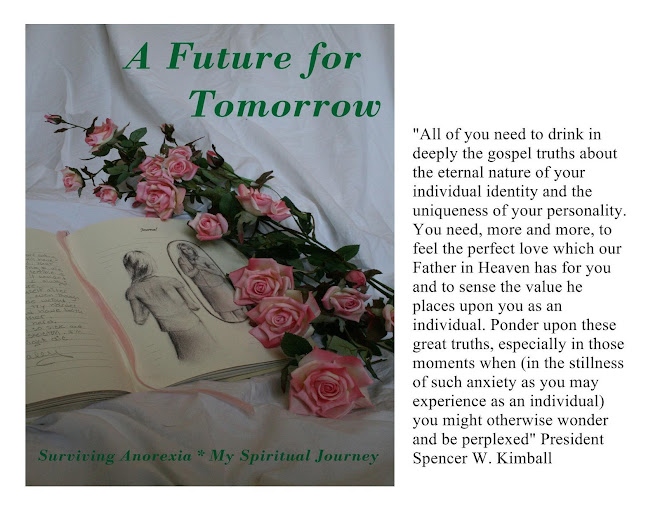I want to first explain what it is, this is the statement on Intuitive Eating.org:
"Intuitive eating is an approach that teaches you how to create a healthy relationship with your food, mind, and body--where you ultimately become the expert of your own body. You learn how to distinguish between physical and emotional feelings, and gain a sense of body wisdom. It's also a process of making peace with food---so that you no longer have constant "food worry" thoughts. It's knowing that your health and your worth as a person does not change because you ate a so-called "bad" or "fattening" food."
When I started counseling for anorexia after I left the hospital my counselor said he was going to use the same treatment for me as he would a person who weighed 400 pounds struggling with food addictions.
I learned then that overeating or under eating is caused by the same underlining issues.
At that time he introduced a little bit of the concept behind intuitive eating but it wasn't called that. He focused on trusting your body and trying to get me to learn to connect to my bodies needs again. (Also he helped me begin to work out the underlining issues which is key to recovery on the emotional end.)
I then started using the intuitive eating methods without even knowing it by just doing what I discovered was and wasn't working for me. For example I noticed I actually LOST weight during the HOLIDAYS! After a year or two of this happening I finally connected that it was because I gave myself complete permission to eat whatever I wanted because "it was the holidays" and eating certain treats was part of the celebration. I didn't deprive myself of anything and so naturally I was listening to my body more. I found myself wanting less because there were no "forbidden" foods or amounts. I later learned this is the major concept behind intuitive eating - banning nothing. It really does keep you from obsessing.
For instants if I told you that you could eat anything you want for the next week except for blueberry muffins, guess what will happen? You will crave and obsess over blueberry muffins!!!
Restricting leads to obsessing, then eventually when you do "give in" it usually leads to binging, then feelings of guilt, then the cycle often starts over again.
Then I took a course at college about eating behaviors and the principals were taught as a healthy way to create a better relationship with food. I really grabbed hold of it then, like I said before, I never heard the actual term intuitive eating until recently but people were learning the truth behind these principals then, and they do work and did for me.
Why intuitive eating? Because diets don't work!
95 Percent of Dieters Regain Weight Within 1 to 5 Years (-Tom at RealSelf on Jul 2, 2009)
Here is a summary of the 10 principles of Intuitive Eating, from the book, Intuitive Eating, 2nd ed, 2003.
by Evelyn Tribole, MS, RD and Elyse Resch, MS, RD, FADA
Intuitive Eating Principles
1. Reject the Diet Mentality Throw out the diet books and magazine articles that offer you false hope of losing weight quickly, easily, and permanently. Get angry at the lies that have led you to feel as if you were a failure every time a new diet stopped working and you gained back all of the weight. If you allow even one small hope to linger that a new and better diet might be lurking around the corner, it will prevent you from being free to rediscover Intuitive Eating.
2. Honor Your Hunger Keep your body biologically fed with adequate energy and carbohydrates. Otherwise you can trigger a primal drive to overeat. Once you reach the moment of excessive hunger, all intentions of moderate, conscious eating are fleeting and irrelevant. Learning to honor this first biological signal sets the stage for re-building trust with yourself and food.
3. Make Peace with Food Call a truce, stop the food fight! Give yourself unconditional permission to eat. If you tell yourself that you can't or shouldn't have a particular food, it can lead to intense feelings of deprivation that build into uncontrollable cravings and, often, bingeing When you finally “give-in” to your forbidden food, eating will be experienced with such intensity, it usually results in Last Supper overeating, and overwhelming guilt.
4. Challenge the Food Police .Scream a loud "NO" to thoughts in your head that declare you're "good" for eating under 1000 calories or "bad" because you ate a piece of chocolate cake. The Food Police monitor the unreasonable rules that dieting has created . The police station is housed deep in your psyche, and its loud speaker shouts negative barbs, hopeless phrases, and guilt-provoking indictments. Chasing the Food Police away is a critical step in returning to Intuitive Eating.
5. Respect Your Fullness Listen for the body signals that tell you that you are no longer hungry. Observe the signs that show that you're comfortably full. Pause in the middle of a meal or food and ask yourself how the food tastes, and what is your current fullness level?
6. Discover the Satisfaction Factor The Japanese have the wisdom to promote pleasure as one of their goals of healthy living In our fury to be thin and healthy, we often overlook one of the most basic gifts of existence--the pleasure and satisfaction that can be found in the eating experience. When you eat what you really want, in an environment that is inviting and conducive, the pleasure you derive will be a powerful force in helping you feel satisfied and content. By providing this experience for yourself, you will find that it takes much less food to decide you've had "enough".
7. Honor Your Feelings Without Using Food Find ways to comfort , nurture, distract, and resolve your issues without using food. Anxiety, loneliness, boredom, anger are emotions we all experience throughout life. Each has its own trigger, and each has its own appeasement. Food won't fix any of these feelings. It may comfort for the short term, distract from the pain, or even numb you into a food hangover. But food won't solve the problem. If anything, eating for an emotional hunger will only make you feel worse in the long run. You'll ultimately have to deal with the source of the emotion, as well as the discomfort of overeating.
8. Respect Your Body Accept your genetic blueprint. Just as a person with a shoe size of eight would not expect to realistically squeeze into a size six, it is equally as futile (and uncomfortable) to have the same expectation with body size. But mostly, respect your body, so you can feel better about who you are. It's hard to reject the diet mentality if you are unrealistic and overly critical about your body shape.
9. Exercise--Feel the Difference Forget militant exercise. Just get active and feel the difference. Shift your focus to how it feels to move your body, rather than the calorie burning effect of exercise. If you focus on how you feel from working out, such as energized, it can make the difference between rolling out of bed for a brisk morning walk or hitting the snooze alarm. If when you wake up, your only goal is to lose weight, it's usually not a motivating factor in that moment of time.
10 Honor Your Health--Gentle Nutrition Make food choices that honor your health and taste buds while making you feel well. Remember that you don't have to eat a perfect diet to be healthy. You will not suddenly get a nutrient deficiency or gain weight from one snack, one meal, or one day of eating. It's what you eat consistently over time that matters, progress not perfection is what counts.
Challenge:
I would like to challenge you to pick a step from the list above and try it. I would recommend starting with giving yourself unlimited permission to eat all foods. No more restricting!
I think there are several books about Intuitive Eating but this is the one that I have gotten the info from and it looks like a great resource.























1 comment:
Thanks for the ideas, Haley. I finally feel like I have a pretty good relationship with food now, after struggling for years. Thanks for your advice and suggestions. You are a good 'counselor'. :)
Post a Comment